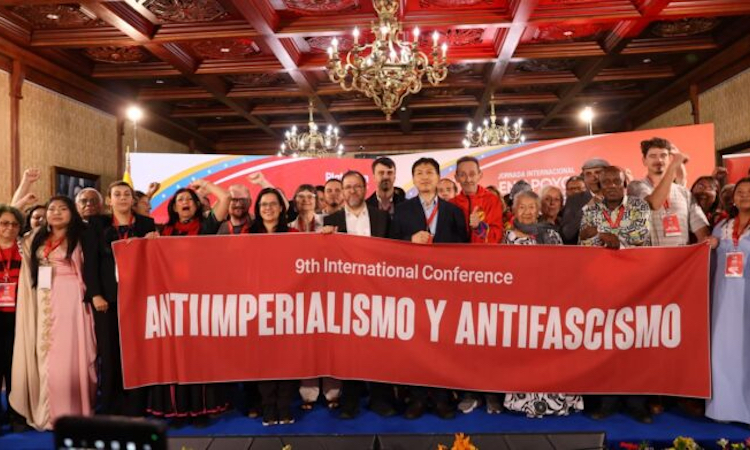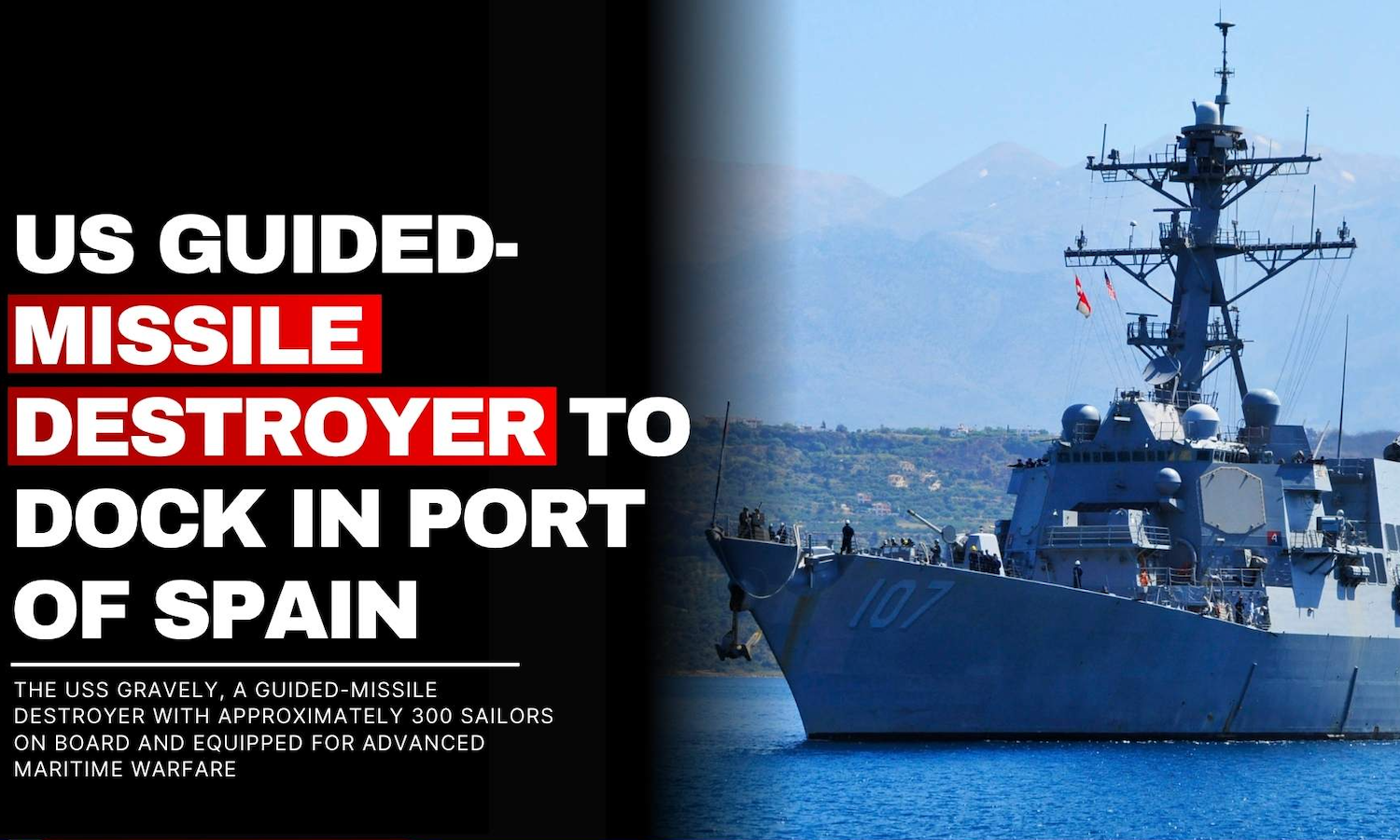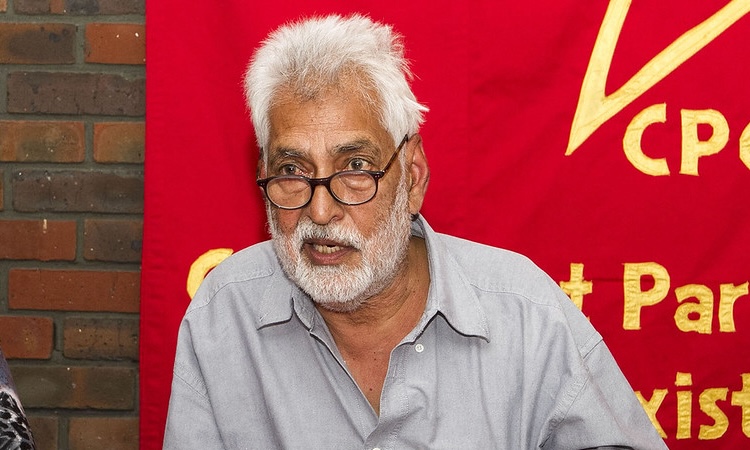Episode 13 of our series of talks between Harpal Brar and Caleb Maupin covers the question of war and peace, examining the connection between war and monopoly capitalism (imperialism) and how the essential insights of VI Lenin can help today’s socialists advance the working-class struggle for genuine peace.
Comrade Joti Brar introduces the discussion with a reminder about the destructive nature and force of imperialist war. How, she asks, can socialists put an end to such horrors in the conditions of the continued capitalist domination of the globe?
Comrade Harpal explains that Lenin brought a new understanding of war to the working class. Modern war is a product of imperialism, the result of the monopoly capitalist partitioning and repartitioning of the world. He reminds viewers that the essential question we need to ask in relation to any particular war is: “What is the class character of this war?”
Harpal points out that war is built into the system and takes place because of the contradictions within capitalism. Contrary to bourgeois claims of “fighting for freedom”, imperialism doesn’t seek liberty; it seeks domination.
This point is continually underlined by old and new imperialist wars and colonial and neocolonial projects.
The destructive nature of imperialist war for domination contrasts with the socialist support for just wars. A just war might be a war of national liberation against imperialism, a war of self-defence from attack by imperialism, or a war of the proletariat against the bourgeoisie.
Analysing the class content of the war is the only way to understand which side, if any, workers should be supporting. This has nothing to do with who fired, or appeared to fire, the first shot.
As Carl von Clausewitz wrote in 1831: “War is the continuation of politics by other means.” To understand the war, we must therefore understand the politics that both sides are continuing to follow.
The distinction between just and unjust wars, developed by Lenin from earlier Marxist writings, is generally ignored, distorted or dropped by revisionists (ie, people who ‘revise’ Marxism to the detriment of our movement), many of whom take the pacifist position of opposing all wars regardless of their class character.
At the same time, such revisionists reject that notion that monopoly capitalism inevitably leads to war and that wars can only be prevented by abolition of the capitalist system and the transition to socialism. They instead promote the delusion that war is a policy of this or that government, and there is a way to persuade the ruling class of an imperialist country not to go to war on behalf of monopoly capitalist interests.
The early German revisionists (as represented by the right opportunist Eduard Bernstein and the renegade Karl Kautsky) set the pattern for many later revisionists more than a century ago. They distorted the question of war in several important ways.
- By refuting Lenin’s groundbreaking work, which demonstrated conclusively that imperialism is the source of war in the modern world.
- By intimidating workers with the assertion that a war between big powers would destroy humankind (thus promoting the idea that pacifism must be pursued regardless of the cost to humanity of continuing to live under conditions of imperialist wage-slavery, growing inequality and endless war).
- By propagating the theory that peace could be safeguarded and the equality of nations achieved through disarmament – despite that fact that weapons are the most important source of imperialist intimidation of small and weak nations and despite the fact that, to paraphrase Lenin and Marx: “Capitalism wouldn’t be capitalism if it were able to use its wealth for the benefit and wellbeing of the people”.
- By refusing to distinguish between just wars for liberation, self-defence or socialism and imperialist wars for profit and domination.
Comrade Caleb also cites Lenin in discussing how people today continue to be duped into supporting imperialist wars by their political leaders. One must look at the real motivations for a war rather than simply accepting the politicians’ public statements about fighting “to stop a genocide” or “to rescue some people from a tyrant”. We live in an age of propaganda and media deception, and the stories we are told by politicians bear little or no relation to the facts.
As revolutionaries, we must embrace “revolutionary defeatism”, says Caleb – we must welcome and actively work for the defeat of our own ruling class in an imperialist or a class war. The inability to embrace this outlook by social democrats was clearly revealed during the course of World War 1, when social-democratic parties across Europe supported their own national bourgeoisies instead of working for their defeat and for the transformation of the war into a revolution against capitalism as the Bolsheviks did.
Lenin described this phenomenon in many of his works during the 1914-18 war, but his position is encapsulated in the pamphlet Imperialism and the Split in Socialism, which is essential reading.
Joti reiterates how Lenin not only defined the characteristics of the present era of capitalist imperialism but also left us a deep analysis of the relationship between imperialism and war. The people long for peace, but we must understand clearly how we can achieve a genuine, just and lasting peace.
Remembering the distinction between the various forms of imperialist wars that socialists oppose and the just wars that we support, it is vital to recognise that only a class war to remove the capitalists from power and dismantle their exploitative system can bring end the bloody rule of monopoly capital – the root cause of poverty, inequality, unemployment and war – and allow the workers to build a new world characterised by prosperity, fraternity and peace.
This conversation was recorded in January 2023.











